Category: "Uncategorized"
Чёрт
The Russian word for devil is чёрт. It's a bit irregular because it becomes soft in the plural, thus it declines like this:
| Sg | Pl | |
| Nom | чёрт | черти |
| Acc | чёрта | чертей |
| Gen | ||
| Pre | чёрте | чертях |
| Dat | чёрту | чертям |
| Ins | чёртом | чертями |
In English it sounds rather quaint to say "Go to the devil," but in Russian the phrase is much stronger and not quaint at all. To catch the emotional color of it in English, it is best to translated it as "Go to hell":
| Иди к чёрту! Идите к чёрту! |
Go to hell! |
Another way to say about the same thing is to literally say "The devil with you":
| Чёрт с тобой! Чёрт с вами! |
To hell with you! |
| Чёрт с ним! | To hell with him! |
| Чёрт с ней! | To hell with her! |
| Чёрт с ними! | To hell with them! |
In the US many Christians consider it offensive to take the Lord's name in vain. In Russia it is more offensive to swear using the word "devil." Interestingly enough, by saying "to God with him" they can express indifference or minor irritation. It's not nearly as strong as saying "The hell with him" and can be said in polite company, so I think it is best to translate those phrases into English with "To heck with him/her":
| Бог с ним! | To heck with him! |
| Бог с ней! | To heck with her! |
| Бог с ними! | To heck with them! |
Of course, if you are a sensible foreigner, you aren't going to go around Russia telling the Russians to go to hell, but you will still encounter the word in real life, art, and literature. My favorite "to hell with you" is in a song by Веня Д’ркин called «Ты нравишься мне» “I like you”. Ah, rage and betrayal and desperate love all wrapped up in one melodious package. You can listen to the song here, along with a translation.
Дно
One of the words I love in Russian is дно, which means bottom in the sense of the bottom of a glass or the bottom of the ocean or the bottom of a barrell. I love it because words just don't start with 'dn' in English, so it's a complete shock when students first encounter it. We English speakers want to put a vowel between the д and the н, but the Russians don't do that at all. Insteaad they start making the д sound, and the air that builds up in the mouth behind the tongue is released through the nose. The singular of the word is perfectly regular, but it has an irregular plural:
| Sg | Pl | |
| Nom | дно | донья |
| Acc | ||
| Gen | дна | доньев |
| Pre | дне | доньях |
| Dat | дну | доньям |
| Ins | дном | доньями |
The place American students of Russian are most likely to first encounter this word is when they go to Russia for their first study-abroad program. The first week of class they diligently do their homework every day, and then Friday night rolls around and their new Russian friends invite them home for dinner and vodka, and once the vodka starts flowing they learn the phrase «до дна» "to the bottom," which essentially means their buddies don't want them to sip the vodka like a sensible human being, but to do the shot all at once and then follow it with beer, wine, or more vodka. Thus «до дна» is about the equivalent of the phrase "bottoms up" in English. (And of course in the morning the students wake up with похмелье and swear they will never drink again, which of course doesn't work because they are in Russia. To really refuse alcohol in Russia you need a nice solid religious mooring, so I recommend that all my readers immediately become Baptists.)
But of course the word has a thousand other uses that have nothing to do with alcohol:
| Президент Монголии опустился на дно Байкала. (source) | The President of Mongolia has traveled to the bottom of Lake Baikal. |
| На дне Мексиканского залива найдено "ужасающее" количество нефти. (source) | A horrifying amount of oil has been found on the bottom of the Gulf of Mexico. |
| Со дна Балтийского моря подняли самое старое в мире шампанское. (source) | The world's oldest champaigne has been raised from the bottom of the Baltic Sea. |
| Европейский авторынок идет ко дну. (source) | The European auto market is tanking. [lit. "going to the bottom"] |
Пакет
The Russian word for a plastic bag, like the kind you get in a grocery store to hold your groceries, is пакет. It's a completely regular noun. In many American grocery stores the cost of the bag is included in the price of the food, and the cashier and bagger will automatically bag the food for you. Not so in Russia. Usually the cashier will ask you something like:
| Пакет нужен? | Do you need a bag? |
To which you may respond
| Да, пожалуйста. | Yes, please. |
or
| Нет, не нужен. | No, I don't. |
and then you bag the groceries yourself. Since they actually have to pay for a plastic bag every time they get one, the Russians are much more careful with them than Americans are. If you are about to go to the grocery store, you pack a few plastic bags in your purse or pocket. I've been in Kazan over a month now, and I can tell you that anytime I go out of the house, I make sure I have at least one plastic bag neatly folded in my briefcase or back pocket just in case I have to buy something on the way.
Here are some sample sentences:
| — Что у тебя в пакете? — Водка, пиво и копчёная рыба. |
"What do you have in the bag?" "Vodka, beer, and smoked fish." |
| Я всегда ношу с собой два-три пакета на случай, если надо будет что-то купить. | I always carry two or three plastic bags with me just in case I have to buy something. |
| Из пакета мама вынула торт «Птичье молоко». | Mama took a Bird's Milk Cake out of the bag. |
| Потеряв палец или стопу, упакуй её в двойной пакет. (adapted from here) | If you lose a toe or a foot, pack it in a double plastic bag. |
Киоск
One word that gets used a lot more in Russian than in English is киоск kiosk. I think the average American doesn't normally use this word, and I think most of us don't even have a clear idea of what it means. My first encounter with the word in English was at the University of Arizona. There were several brick structures which we called kiosks that had bulletin boards attached to which one could staple announcements for concerts, parties, businesses, etc. That is not what киоск means in Russian. A киоск is a small stand or booth where people sell things. Usually it's a free-standing structure, though it can also be part of a larger one. (It's never just a cart.) These are everywhere in Russia: at train stations, in the subway, anywhere there is a pedestrian street. And they sell all kinds of stuff. To say what kind of stand it is, Russians sometimes put an adjective before the noun:
| газетный киоск | news stand |
| сувенирный киоск | souvenir stand |
| цветочный киоск | flower stand |
| книжный киоск | book stand |
| пивной киоск | beer stand |
Sometimes the description of the stand comes in the genitive case after the noun:
| киоск ремонта обуви | shoe repair stand |
During the Soviet period you could find the oddest things at kiosks. The ones that seemed to have the most variety were the газетные киоски. I remember seeing toothbrushes and red pepper being sold в газетных киосках.
The noun itself is fairly straightforward with no grammatical quirks (as long as you remember the seven-letter spelling rule). Here are some sample sentences:
| Я никогда не хотела работать в сувенирном киоске, но я здесь работаю уже пятый год. | I never wanted to work at a souvenir stand, but I've been working here for going on five years now. |
| Рядом с цветочным киоском находится банкомат. | There is an ATM next to the flower shop. |
| Когда я подошёл к газетному киоску, Комсомольксой правды уже не было. | When I walked up to the news stand, they were already out of Komsomol'skaya Pravda. |
| Если хочешь открыть пивной киоск около станции метро, то надо платить крыше, а то киоск подожгут. | If you want to open a beer stand near the subway station, then you have to pay protection money, otherwise they'll set the stand on fire. |
Here are some shots of various kiosks around Kazan. This first one is basically a beer, snacks, and tobacco place. Its sign reads:
| BEER JUICE SOFT DRINKS |
24 hours |
PHOTOCOPIES DOCUMENT PRINTING HOOKAH SUPPLIES |
There is a reason that they offer printing services here. Right nearby there is an Architectural University. Universities here don't offer printing services to their students. They often don't have the internet. And students are too poor generally to own printers.
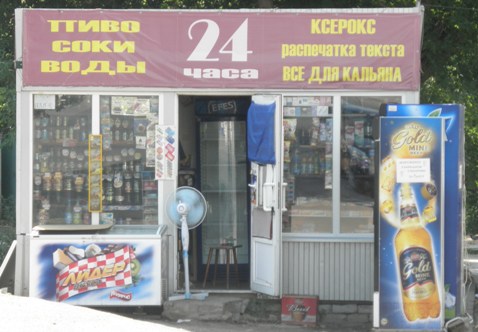
This next one is a flower stand.
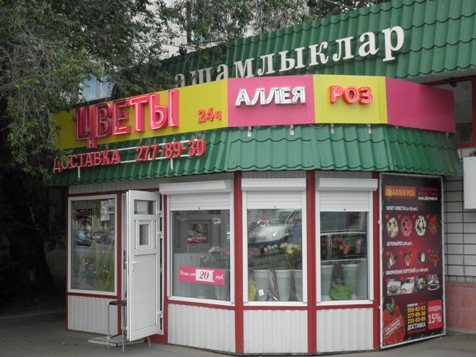
And here we have a souvenir stand:
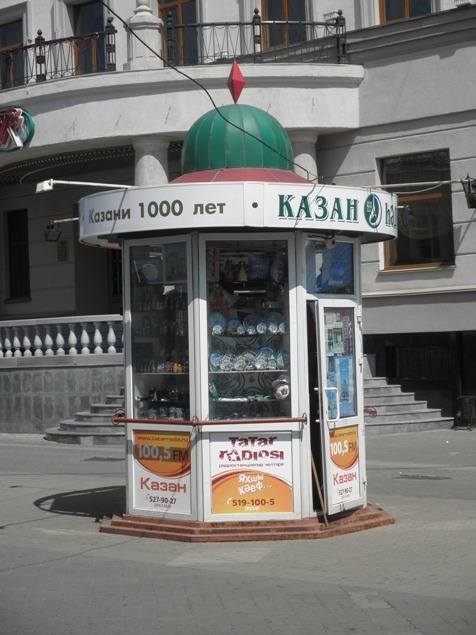
This next one is a shoe repair stand.
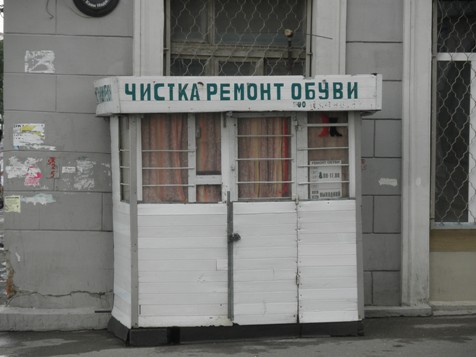
And here is a beer stand. The beer stand is interesting because you have to pay for both the beer and the container. If you bring your own plastic bottle in, then you just pay for the beer and they fill your bottle for you.
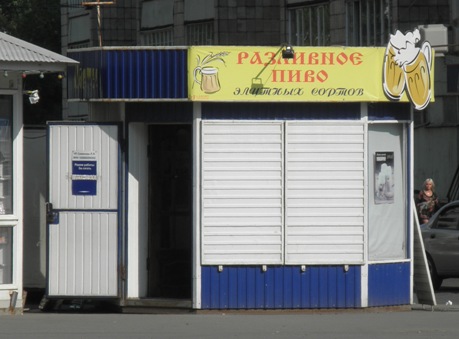
Last but not least, here is a little auto supply kiosk. They mostly sell oil and antifreeze.
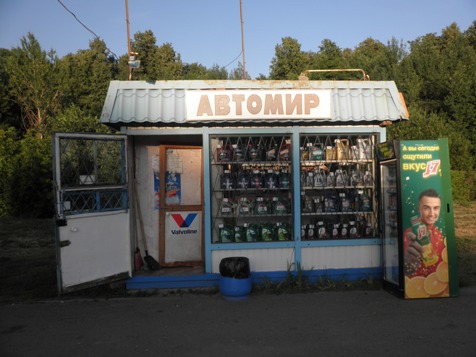
Корточки
One thing that surprises Americans in Russia is how often you can see people squatting. In the States I think most people lose this ability somewhere by the time they are thirty; constantly sitting in chairs allows the hamstrings and calf muscles to get tighter and tighter, which means those muscles lack the elasticity to maintain the position. (Regular attendance at yoga classes can help you bring that elasticity back.) The prepositional phrases in Russian used to describe this position include the word корточки. It only occurs in the plural, and theoretically in all six cases, though truth to tell I have never seen it in the instrumental, dative, or nominative:
| Pl | |
| Nom | корточки |
| Acc | |
| Gen | корточек |
| Pre | корточках |
| Dat | корточкам |
| Ins | корточками |
If a person is in a squatting position, one mostly uses the verb сидеть/посидеть 'to be sitting' to capture the image. This verb is a location verb, thus you use with with the prepositional case and the preposition на.
| На этой фотографии вы увидите, как мужчина сидит на корточках. | In this photograph you will see a man squatting. |
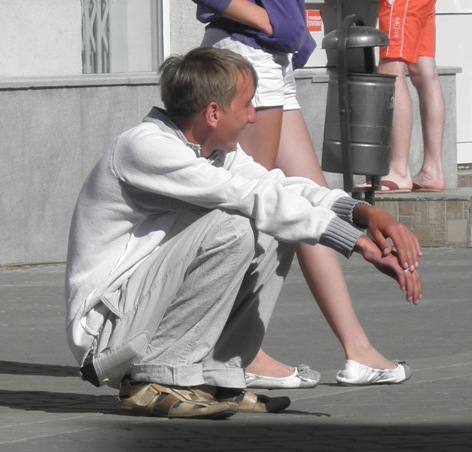
When anthropologists discuss this position, they often use the word 'hunkering.' In the fully developed position the buttocks rest on the back of the shins or ankles. Young Russian men often hunker together in summer evenings smoking cigarettes and drinking beer. You aren't really supposed to drink beer on public streets in Russia, but as long as you aren't causing trouble, the police generally turn a blind eye:
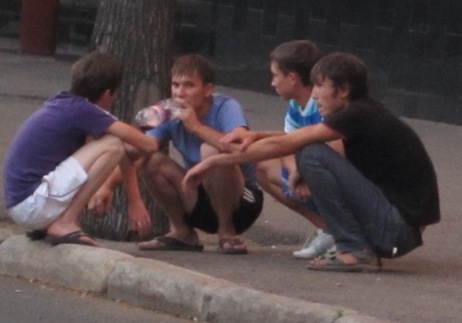
To describe getting into that position, you most commonly use the verb садиться/сесть 'to sit down,' although you can also use присаживаться/присесть or опускаться/опуститься. These are motion verbs, so you use them with на plus the accusative:
| Дима сел на корточки и позвонил своей девушке. | Dmitri squatted down and called his girlfriend. |
| Один из симптомов повреждения менисков коленного сустава — это невозможность присесть на корточки. (adapted from this source) | One of the symptoms of damaged menisci of the knee joints is the inability to squat. |
| Мне так не хотелось приближаться, но я вдохнула неглубоко через рот и опустилась на корточки рядом с ним. (adapted from this source) | I really didn't want to get closer, but I inhaled a bit through my mouth and squatted down next to him. |
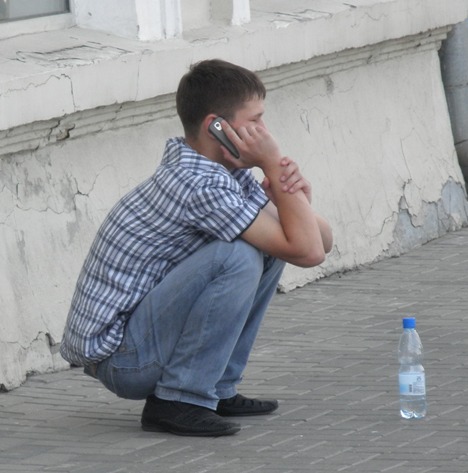
<< 1 ... 18 19 20 ...21 ...22 23 24 ...25 ...26 27 28 ... 41 >>